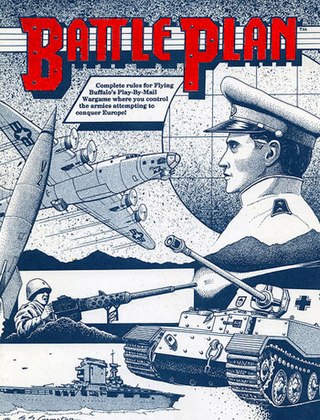
A play-by-mail game is a game played through postal mail, email, or other digital media. Correspondence chess and Go were among the first PBM games. Diplomacy has been played by mail since 1963, introducing a multi-player aspect to PBM games. Flying Buffalo Inc. pioneered the first commercially available PBM game in 1970. A small number of PBM companies followed in the 1970s, with an explosion of hundreds of startup PBM companies in the 1980s at the peak of PBM gaming popularity, many of them small hobby companies—more than 90 percent of which eventually folded. A number of independent PBM magazines also started in the 1980s, including The Nuts & Bolts of PBM, Gaming Universal, Paper Mayhem and Flagship. These magazines eventually went out of print, replaced in the 21st century by the online PBM journal Suspense and Decision.

Flying Buffalo Inc. (FBI) is a game company with a line of role playing games, card games, and other gaming materials. The company's founder, Rick Loomis, began game publishing with Nuclear Destruction, a play-by-mail game which started the professional PBM industry in the United States. Loomis added games and players while introducing computer moderation and soon incorporated into the company Flying Buffalo Inc. The company published games in other genres, including card games such as Nuclear War and a role playing game called Tunnels & Trolls, a game similar to Dungeons & Dragons. Flying Buffalo acquired its 10,000th customer account number in 1980 and reached its largest size of 21 employees in 1983.
Starweb is a closed-end, space-based, play-by-mail (PBM) game. First published by Flying Buffalo Inc. in 1975, it was the company's second PBM game after Nuclear Destruction, the game that started the PBM industry in 1970. Players today can choose a postal mail or email format. Fifteen players per game assume one of six available roles and explore and conquer planets within a universe comprising 225 worlds. The object of the game is to attain a predetermined number of points which are generated by various actions during gameplay. Multiple game variants are available. Starweb is still available for play as of 2021 through the company Rick Loomis PBM Games.

Legends is a turn-based, role-playing game with a medieval setting. It is currently published in English by Harlequin Games. Jim Landes—owner of Midnight Games, the game's first publisher—began developing the game in 1984, eventually publishing it in December 1989 as a play-by-mail (PBM) game after over a year of playtesting. The initial game comprised a module and game system built on the publisher's existing game, Epic, and was run briefly as Swords of Pelarn before publication as Legends. The first of multiple game modules was Crown of Avalon, which allowed up to 200 players per game. Demand by 1991 was "incredible" according to Bruce R. Daniel in White Wolf. Games could be lengthy, initially between three and ten years of play, settling into an average of three years by 2002.

Rick Loomis was an American game designer, most notable as the founder of game publisher Flying Buffalo, which he managed until his death.

Empyrean Challenge is a strategic science fiction play-by-mail (PBM) game. Published by Superior Simulations in 1978, its introduction was important to the nascent PBM industry. 150 players per game strove to dominate a cluster of star systems. Diplomacy, combat, economics, technological development, colonization, and other factors were important aspects of gameplay. Detailed work was required in all aspects of the game, requiring a significant investment in time for players. Reviewer Jim Townsend stated in 1988 that Empyrean Challenge was "the most complex game system on Earth".

The Nuts & Bolts of PBM was a magazine dedicated to play-by-mail games, first published in June 1980 as Nuts and Bolts of Starweb, and edited by Richard J. Buda. The magazine incorporated in 1983 to Bolt Publications. Rick Loomis of Flying Buffalo Games stated in 1985 that the Nuts & Bolts of PBM was the first PBM magazine not published by a PBM company. He stated that "It was a fun magazine, but somewhat ahead of its time, and it had no financial backing." Afterward, the name changed to Nuts & Bolts of Gaming.

Heroic Fantasy is a computer-moderated, dungeon crawl play-by-mail game. It has been active since 1982 when it was published by Flying Buffalo. The initial edition involved nine dungeon levels. Flying Buffalo published subsequent editions due to challenging gameplay initially, eventually limiting the game to four dungeon levels with a fifth outdoors level where players can assemble an army and capture one or more castles. The game is open-ended; gameplay continues until players decide to stop.

Gaming Universal was a magazine dedicated to play-by-mail games. The magazine was published between 1983 and 1988, in two separate print runs with Bob McLain as editor of both editions. Its first print run was published by Imagascape Industries between November 1983 and 1985. The first issue was called PBM Universal, with a name change by the second issue. The second edition ran between 1987 and 1988, published by Aftershock Publishing. The magazine received average to positive reviews from other magazine editors and reviewers.

Hyborian War is a play-by-mail game published by Reality Simulations, Inc. It takes place during the Hyborian Age in the world of Conan the Barbarian created by Robert E. Howard. The game has been continuously available for worldwide play since its inception in 1985 and has changed little in its overall format. It uses a computer program to adjudicate player orders. Although it relies on postal mail or email and has turnaround times which are relatively long for the digital age of video games, Hyborian War has remained active into the 21st century.
Midgard is an open-end, medieval fantasy play-by-mail game. It was published in 1984 by Time Space Simulations. Through 1996, the game passed through more than four different publishers, including Midgard USA. As of 2022, Talisman Games is the publisher. At initial publication, Midgard was computer moderated with partial human moderation.
Paper Mayhem is an out-of-print play-by-mail (PBM) game magazine that was published in Ottawa, Illinois. The staff published the initial issue in July 1983 and the magazine ran until mid-1998. Its format was 40 pages published six times per year. The magazine was the most well-known of the play-by-mail periodicals of the period, providing articles and reviews of play-by-mail games, as well as reader-informed ratings of play-by-mail companies, game masters (GMs) and games, both intermittently and on an annual basis. The magazine, along with its long-time editor-in-chief, David Webber, was influential in the play-by-mail community, even echoing into 21st century play-by-mail activities. The publication ceased suddenly in mid-1998 following the unexpected death of Webber.
Lords of the Earth (LOTE) is a play-by-email game, first published by Thomas Harlan in 1983 during a growing era of PBM games. Initially played by postal mail, the game featured mixed moderation—computer moderated with some human assistance. By 2002, the publisher processed turns by email (PBeM). Lords of the Earth comprises multiple campaigns, each one a separate game. Campaign 1 is the oldest, set in the mid-1800s in the "Age of Air and Steam". Other campaigns begin from 2000 BCE to 1400 CE. Settings were global in scale, with one campaign featuring an outer space setting.
Schubel & Son was a hobby and gaming company that published play-by-mail (PBM) games. The company began in 1974 and expanded to large-scale PBM games in August 1978. It also published the game The Tribes of Crane in 1978, followed by StarMaster in 1980 and Global Supremacy in 1982.

Battle Plan is a closed-end, military strategy, play-by-mail (PBM) wargame. It was first published by Flying Buffalo Inc. in 1972, as one of the company's game offerings after Nuclear Destruction, the game that started the PBM industry in 1970. In August 2021, Rick Loomis PBM Games began publishing the game.

Galac-Tac is a closed-end, science fiction, play-by-mail (PBM) wargame. It was first published by Phoenix Publications in 1982. By 1990, the publisher had changed its name to Delta Games, and then later to Talisman Games. In 2010, Talisman Games changed ownership and transitioned Galac-Tac to a web-based game. It is still available for play by postal mail or email for those with web access challenges. The game has been updated as well as reviewed multiple times in its 40 years of active play. Various reviews in the 1980s and 1990s provided both positive and negative comments as well as potential areas for the game to improve. The game has been featured numerous times in the modern PBM magazine, Suspense & Decision.

Victory! The Battle for Europe is a closed-end, military strategy, play-by-mail (PBM) wargame. The game was first published by Rolling Thunder Games, Inc. in 1991 after a period of initial growth in the PBM industry. The game centers on Europe while including parts of North Africa, the Middle East, the United States, and Canada. Forty players start each game with equal resources among countries, although geography causes differences between starting positions. Games last for about three years each. The game received positive reviews and rankings in the PBM magazine Paper Mayhem in the 1990s, including tying for second place in its Best PBM Game of 1995 list.

Quest is an open-end, fantasy, play-by-mail (PBM) role-playing game. Initially released in the United Kingdom in 1991, by Adventures by Mail, it later became available for play in the United States, Australia, and other countries in Europe. The game has a First and Second Age, initially comprising about twenty worlds of up to 1,000 parties controlled by players. After the year 2000, the worlds consolidated into four. The current publisher is KJC Games.
Terra II is a open-ended, play-by-mail (PBM) wargame published by Clemens & Associates.













